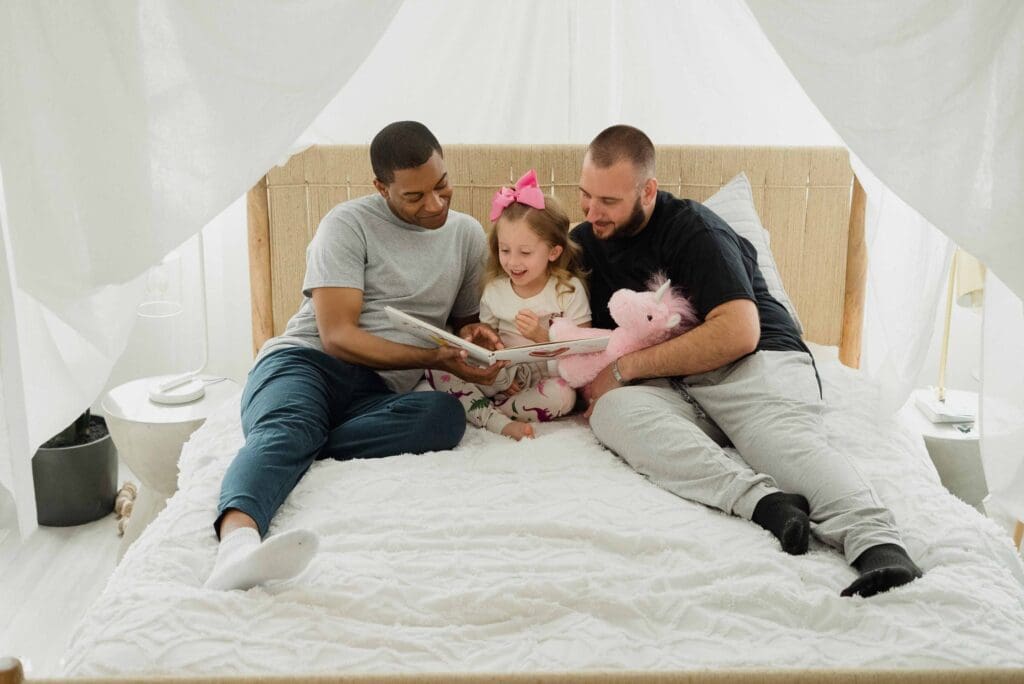How to Confidently Raise a Child as a Same-Sex Couple

In this article
All parents soon learn that once you have a child, you’ll receive unsolicited advice, criticism, or disapproval from relatives, friends, and even strangers on the street. Somehow, having a child seems to give people the impression that they can pass judgment on you and your decisions in a way that they never would for any other part of another person’s life.
If you’re parenting as a same-sex couple, you might feel like your decisions are under even greater scrutiny. Before this gets you down, be reassured that there is plenty of evidence that same-sex parents do just as good a job as different-sex couples when it comes to raising children. Don’t hesitate to explore the option of consulting with an online therapist.
Here we’ll look at the steps you can take to confidently raise a child as a same-sex couple, despite what others might have to say about it.
LGBT Parenting
If you feel alone in your decision to have a child as a same-sex couple, you certainly aren’t. The Williams Institute at UCLA found that an estimated 37% of LGBT-identified adults have had a child at some time in their lives. This equates to around 3 million American parents.
Of the LGBT-identified adults aged under 50, almost half of LGBT women are raising a child aged under 18, with a fifth of LGBT men doing the same.
Like any couple, it is vital to have complete confidence in the strength of your relationship prior to starting a family. Bringing children into your family will bring joy and fulfillment. But it is also one of the greatest pressures you can add to your relationship. A relationship that does not have solid foundations will be tested even further by the arrival of babies or children.
If you are unsure whether you are ready for children, you and your partner may benefit from some individual therapy or therapy as a couple. In-person or online therapy may help you to work through any concerns or fears you have so that you can feel confident in your decision to start your same-sex parenting journey.
Starting a Family
Once you are ready to become a family, make sure you read up on the legislation in your state or country. Doing your research before getting pregnant will ensure you and your partner both have the parenting rights and titles you want.
Depending on how you intend to add children to your family, you may need to consider whether you can legally adopt a child together. Or seek advice on whether there is any legal paperwork required to ensure both your names are on the child’s birth certificate.
The Birth
If you or your partner will be pregnant, or if you plan to adopt from birth or use a surrogate, you may wish to consider your preferences regarding the birth experience.
Think about how you would both like to be involved so that you feel part of the birth of your child. Write your ideas down. This might involve being in the birthing room at all times, being referred to as “mom,” or being the first to hold your baby.
Getting into the parent role as early as possible will give you more confidence in your parenting decisions. Being involved alongside your partner will help you make decisions together and strengthen your relationship.
Raising your Child with Confidence
Once you have a child or children in your life, you’ll want to raise them in a way that feels right for you and is in their best interests. Parenting styles can vary widely, and different children will require unique things from you.
However, there are some simple ways to raise your child with confidence as a same-sex couple.
Read Up
Occasionally, an ugly view about children being better off raised by a mother and a father will rear its head. As a same-sex parent, hearing views such as these can be particularly upsetting. So, it’s important to know and remember that negative opinions are often a sign of prejudice. They do not align with what scientific studies have found.
In fact, a study in 2020 found that children raised from birth by same-sex parents performed better throughout their time at school than children raised by different-sex parents. The same study suggested that children were 4.8 percentage points more likely to graduate than children with different-sex parents.
You can therefore feel confident that same-sex parenting will not adversely affect your child.
Support Groups
Being an LGBT parent may make you feel that you are different from the other parents in the park, at daycare, or at school. Some parents seek out support from an LGBT parenting group both before and after becoming parents. Whether you meet other gay parents virtually or in real life, knowing other gay families can be reassuring.
Some parents will choose to meet up with another rainbow family so that their child can meet another family that looks like theirs. Your child may then be able to make friends with a peer who also has two moms or two dads. Seeing other well-adjusted and happy families can help you feel more confident in the way you are raising your child, too.
Find Diverse Books and TV Shows
Despite improving legal rights for gay couples, mainstream media for children is often heteronormative. Books, TV shows, and children’s pictures often show a mommy and a daddy. Although heteronormativity is commonplace, sprinkle a few diverse books into your child’s collection so that they can see their family depicted in literature and pictures.
As a parent, you may also find it helpful to pick up a non-fiction guide to raising a child as a same-sex couple.
Check for Inclusivity
Before enrolling your child in daycare or school, check their policies on inclusivity. Look for evidence that they celebrate differences, teach children about a variety of families, religions, and cultures, and will be supportive of you as a family. Diverse wall displays, for example, will ensure your child sees their family represented at their daycare or school.
Knowing that you have chosen a welcoming setting will ensure you and your family feel just as valued and respected as any other family in attendance. This can be a real confidence boost as a parent.
Confidence
Many parents worry about their ability as a mother or father. However, your ability to parent well is not defined nor hindered by your sexuality.
If you lack confidence in parenting, you may benefit from online therapy. Speaking to someone who is only interested in supporting and empowering you can be incredibly important for helping you feel confident in your capabilities.
Final Thoughts
Raising a child as a same-sex couple won’t affect your ability to parent. Children of LGBT couples can even outperform children of different-sex couples. However, you may sometimes feel you lack confidence.
Finding a support group, searching for diverse books and TV shows, and choosing an inclusive school for your child can all help you feel more confident about your parenting techniques. Surround yourself with encouraging friends and family. And don’t be afraid to reach out for professional help from a therapist, whether through traditional in-person sessions or online therapy on Calmerry, if you feel you need it. This is all part of nurturing your growth as a parent.
online therapy
live video session



